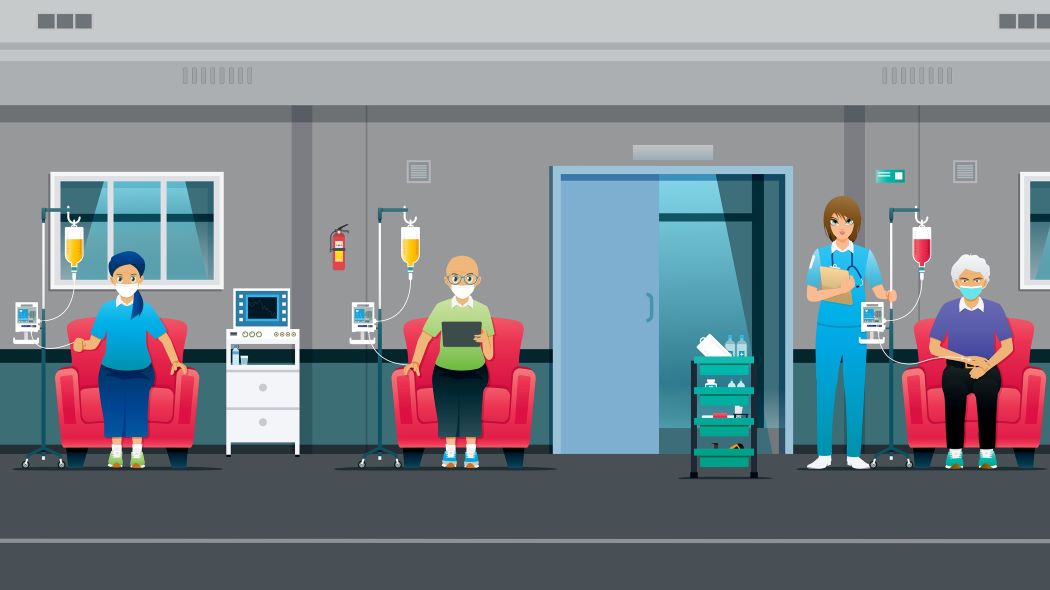Patients may not be aware that infusion centers are quality sites of care that are often more affordable options for receiving infusions for complex conditions such as cancer, rheumatoid arthritis, hemophilia, and hepatitis C.

Specialty medications are used to treat costly and complex conditions like cancer, rheumatoid arthritis and multiple sclerosis. Many of these drugs must be injected or infused by a nurse or provider and the cost of these medications can vary widely from one infusion site to the next.
While medical providers can direct patients to infusion centers in hospital settings – these sites of care often charge more for the same drug compared to physicians’ offices or non-hospital affiliated infusion centers – and may require patients to travel long distances, taking time away from their families and their jobs.
“The medical field has grown up with the idea that the hospital is the main site of care—a place where all treatment had to happen. However, over the last 5-10 years, there’s been a shift in which we’ve realized that many of the things we have historically done in a hospital can perhaps be better done somewhere else.”Dr. Andrew Lasher, chief medical officer at IVX Health
The Infusion Therapy Market is Growing
The infusion therapy market is expected to grow rapidly over the next few years. In 2019, for example, the FDA approved 54 specialty drugs—19 of which are administered through infusion.
According to research, growth of infusion therapy can be attributed to an aging U.S. population coupled with a decreased mobility profile, rising preference for alternate site of care services, and rapid technological advancements in the space.
The research says that infusion administration in places like infusion centers “allow patients to decrease or totally avoid hospital or nursing home stays and resume normal routines and work behaviors while still treating their illnesses.”
Other key benefits of non-hospital based infusion centers that are highlighted in the report include cost savings, patient convenience, therapy adherence, high level of coordination and clinical effectiveness.
Infusion Centers for Safety, Comfort and Convenience
Specialized infusion centers – like those operated by IVX Health – are becoming a popular site of care for infusion therapy. These centers are committed to the patient experience, and unlike most hospitals, provide patients with sources of comfort like private rooms, flat screen TVs with streaming movies, high-speed WiFi, snacks, chairs for their guests, and parking.
“It's really challenging for patients to experience a chronic illness,” Dr. Lasher said. “Some of our patients visit us weekly, and spend several hours receiving an infusion. For them, our setting is a superior place to receive care. They’re infused in a comfortable, quiet place; they can work or relax; and they receive personalized care from a skilled clinician. All of that helps them to stay on a treatment regimen, and keep their chronic condition under control.”
In addition to comfort and convenience, infusion centers follow the same regulatory guidelines and safety standards as hospitals. Their patient-to-nurse ratio is often smaller than a hospital, and they offer more flexible scheduling, including evening and weekend appointment times.
“Our patients receive care from caring nurses and nurse practitioners with deep experience managing adverse reactions,” Dr. Lasher said. “Medication reactions will invariably happen; it’s critical that patients can receive all their care in this high-quality, high-comfort setting.”
Infusion centers work very closely with a patient’s medical care team, providing infusions that are completely in accordance with the manufacturer requirements and the FDA label and follow prescribing provider directions. This guidance includes both the primary infusion medication as well as any supportive care such as reaction management medications. The prescribing doctor remains involved in patient’s care as infusion site nurses contact them with any questions and to provide updates throughout the entire process.
Infusion centers also work with the health plans in advance of the infusion to get necessary authorizations and make sure that a patient has everything they need to receive the infusion safely.
Cigna Specialty Care Options Team Works to Control Costs While Maintaining Value
At Cigna, our Specialty Care Options team, comprised of medical directors, pharmacists, case managers, and care associates, work together to assess the infusion care options available to each customer, and help them decide which setting will offer a convenient, lower cost option for their infusion medications while protecting patient safety.

Cigna Integrated Specialty Pharmacy Management
Specialty drugs are complex and costly. Cigna's ability to manage specialty medications across all aspects of a patient's care leads to lower costs and better outcomes.
